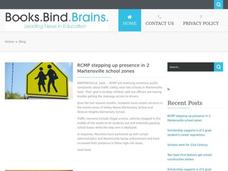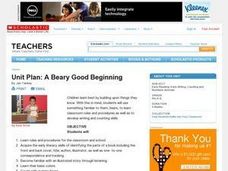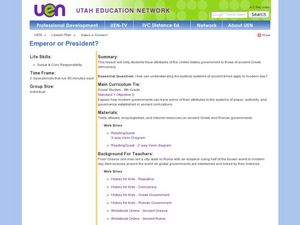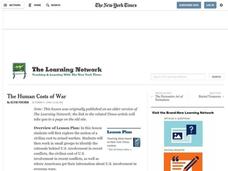Curated OER
Playing the LCM Game
Students practice finding the least common multiple of two numbers. In this practice finding the least common multiple of two numbers lesson, students play head-to-head against their classmates. Students play a version of 'slap jack'...
Curated OER
Ancient Mediterranean Lands: A Timeline of Mediterranean Civilizations
Seventh graders create a timeline for the Mediterranean civilizations. In this Mediterranean lesson, 7th graders make a living timeline for the Mediterranean civilizations.
Curated OER
A Common Thread: The Significance of Wool In Midieval England
Sixth graders fill in a KWL chart and participate in a simulation of role playing about the Renaissance. In this Renaissance lesson plan, 6th graders learn how agriculture affected the culture of Midieval England.
Curated OER
The Race Card
Students use Ernest J. Gaines' A Lesson Before Dying to investigate the reality of legal segregation. In this segregation lesson, students work in groups to study the books characters and how their classification affected the rights they...
Curated OER
Minorities Ruled
Young scholars investigate various European political parties with anti-immigration agendas. They examine and write written reports concerning the party goals of exclusion or restriction of immigrants in their societies. Students...
Discovery Education
Fuss About Dust
Dust is everywhere around us; it's unavoidable. But what exactly is dust and are certain locations dustier than others? These are the questions students try to answer in an interesting scientific investigation. Working independently or...
Curated OER
Rights and Responsibilities
Start a discussion about individual rights and responsibilities with your class. As they will find out there is a difference between a person's rights and their responsibilities. Included are four discussion questions, activity...
Curated OER
Let's Plan a Trip!
Take a virtual trip to see other countries and cultures! After learning about different cultures and populations, English learners think about a place they'd like to visit. Small groups or individuals plan a trip to a country of their...
Anti-Defamation League
Student Dress Codes: What's Fair?
The controversy over school dress codes continues. The debate involves questions like, why is there a policy? Who sets the policy? Who enforces the policy? What is a fair policy? Tweens and teens have an opportunity to engage in the...
Bowland
AstroZoo
Rescue animals in the zoo by applying math concepts. Groups of learners solve three missions involving oxygen, food, and climate control. Each group selects an animal from one of four bio-domes.
Curated OER
Teaching a Current Event
Students discuss current events. In this decision making lesson, students work to solve how an issue in their classroom should be solved by using a six-step discussion procedure. They work as a class to come up with a fair way to solve a...
Alabama Learning Exchange
Bird Migration
Students study the concept of bird migration. For this bird lesson, students read Make Way for Ducklings, discuss the concept of community, and write reflections.
Curated OER
Governance
Students explore government by researching Native American history. In this First Nations culture lesson plan, students define the Aboriginal action of speaking in a circle as a group. Students discuss their likes and dislikes with the...
Curated OER
A Beary Good Beginning
Students complete first day of school activities. Through instructor modeling and demonstration, they become acquainted with the rules and procedures for the classroom and school. Students create a book of their first day experience.
Curated OER
Designing a Civilization for an Art Room
Students discover the ideas of civilizations by researching Gandhi's philosophies. For this art decoration lesson, students investigate Gandhi's opinions on civilizations, community and ethics. Students collaborate by decorating an art...
Curated OER
Emperor or President?
Sixth graders complete a Venn Diagram. In this government comparison lesson plan, 6th graders discuss how rules are similar and different at home, school and in their community. Students learn about the type and structure of the United...
Curated OER
Using Words to Work Things Out
Students use appropriate words to resolve a conflict or a problem. For this appropriate words lesson plan, students participate in a role play, building a puzzle, and creating a good classroom environment and use words that are...
Curated OER
Readers as Individuals
Sixth graders set and are encouraged to meet their reading goals and demonstrate knowledge of literary elements in this lesson.
Curated OER
Families and Neighborhoods
Students create a poster representative of their community. In this lesson on the world around them, students learn about their neighborhood. After they have gathered some knowledge about the objects and people in their community,...
Curated OER
I Am Special and You Are Special Too #7
Pupils determine characteristics that make each of them special. In this personal characteristics lesson, students complete activities that help them determine that each person has special characteristics and that everyone experiences...
Curated OER
Types of Triangles
Learners classify triangles by the length of their sides. In this geometry lesson, students use a white board to demonstrate the angles of various triangles. Learners construct an equilateral, isosceles, and a scalene triangle.
Curated OER
The Human Costs of War
Learners explore the concept of civilian cost to armed warfare. They explore the role of the military, civilians and of press coverage during armed conflicts, creating posters illustrating their research on post-WW II military conflicts.
Curated OER
The Common Tragedy of Consumerism
Pupils evaluate the effectiveness of current climate change solutions. In this global warming lesson, students look at the current measures implemented and analyze whether they are beneficial to the environment or not. Advance reading...
Curated OER
Rosa Parks Community Garden
Ninth graders investigate how we depend on plants as the original source of most food. They investigate the parts of plants, and which parts are edible. Students are explained that the garden is also a classroom and the same rules apply.

























